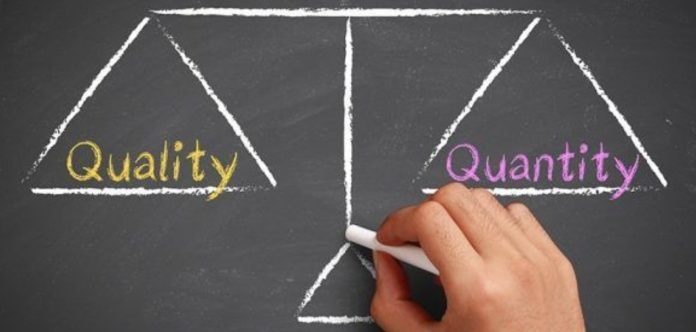Where do you place yourself in the quality or quantity of life debate? Is accumulating a lot of possessions your focus or is your focus more on developing more quality in your life and the way you live it.
If you sometimes find yourself feeling lost or a little empty perhaps you need to focus on things that will give you more meaning and quality of life. Perhaps you could try Fair Go casino Australia for more fun, arrange more get-togethers with friends and family, take cooking classes, or whatever – you get the idea.
The term ‘minimalist’ is often used when referring to achieving a more quality lifestyle, and below we will be looking at both quality and quantity in terms of living in this mindset. So let’s look at the difference between quality and quantity of live.
Quality
When we speak of quality, we are usually referring to how good something is, a product, a service or perhaps a relationship. We often assess the value of something by how much return we get from our investment; that could be in terms of energy, emotional or physical, money or time and this can change over time.
For example, enhancing the quality of the relationship with those close to you.
If we are looking at quality verses quantity in terms of lifestyle, this usually means focusing on ‘needs’ rather than ‘wants’ and is a minimalist way of being in the world. This concept can refer to material items, diet, relationships and many other areas.
Instead of focusing attention and resources on accumulating things, time and energy is spent on things, experiences and people that are deemed more important. Instead of focusing your energy on material objects, you spend time discovering what really makes you happy.
Quantity
The word quantity refers to something that has no end. Unfortunately, there is no guarantee that the more you accumulate the happier you will be. In fact, the opposite is often the case. Having too many things can be a burden.
Living a more minimalist life means focusing on non-material things. Things like health and wellbeing, personal relationships, spirituality and personal growth. Living a more quality-filled life equals having less material things. Minimalism can lead to a more fulfilling and happier existence.
Some examples of living a quality-filled life.
When you begin to see the value of a high-quality life you will need to ask yourself a number of questions, such as “Do I really need this thing?” or “Does this person add value to my life?”
You will need to make decisions like whether to move to a smaller, but perfectly comfortable apartment, in order to save money, time and energy needed to live in a larger one. Or another example could be to decide whether to have two or three special and meaningful friendships or have 10 casual ones.
In a nutshell, the quality of the relationship or the item is what will ultimately give you more fulfilment. This kind of lifestyle is often referred to as valuist.
Minimalist and Valuist Lifestyles
Minimalist Living
A minimalist lifestyle involves reducing the amount of material possessions to what you really need. That means acquiring only things that are essential for daily living. This is what minimalists call intentional living. Consider these questions “Do I need it”, “Will I use it?” “Is this something, or perhaps someone, that I can’t live without?” or “Will it, or they, add something to my life?”
Valuist Living
Living in a valuist way means, in short, using your money for things that you most value. But it doesn’t only have to do with money. It can also be focusing your energy, or time on things that you value most. In other words, living intentionally.
So, for minimalists it means paring down and for valuists it is about where or on what you focus your intention or resources. The ultimate goal of living more intentionally is to have a more fulfilling and meaningful life.
Best-selling authors and Minimalists Joshua Fields Millburn and Ryan Nicodemus say “minimalism is choosing to get rid of life’s excess to focus more on only the possessions and experiences that promote happiness, fulfillment and freedom.”
Ways that may help you change your way of life
Pinpoint your core values
Make a list of things that you value. Maybe it’s education, or learning about different cultures or cultivating friendships? Once you know what is important to you, it will be easier to utilize your resources in a more decisive fashion.
List your priorities
Once you make a point of knowing what your priorities are, it will be easier to concentrate your resources in those areas. Your priorities should be things that will give you satisfaction. For example, investing in your children’s education, instead of blowing money on a holiday, in the belief that this will help them have a successful life. This behavior aligns your priorities with your values.
Once you have decided what is important you will be able to focus all your energy on those things and people and not wasting precious time on unimportant things.
Live life intentionally
Living life in a meaningful way means living according to your beliefs and values. This means living life in a conscious way and making thought out choices that align with your belief system. It is important to find the right balance between the quality and quantity of your material possessions, your resources and your core values.
Sometimes you may wish to be extravagant and spend a lot on certain items or services because the result brings much joy and benefit to those you love and care about. This is also intentional living.
Living your life intentionally will improve the quality of your life. Deciding on the things and experiences that will make you and those you love lead happier lives. This is the true essence of living a minimalist and valuist lifestyle. Living a life of quality rather than quantity.



































